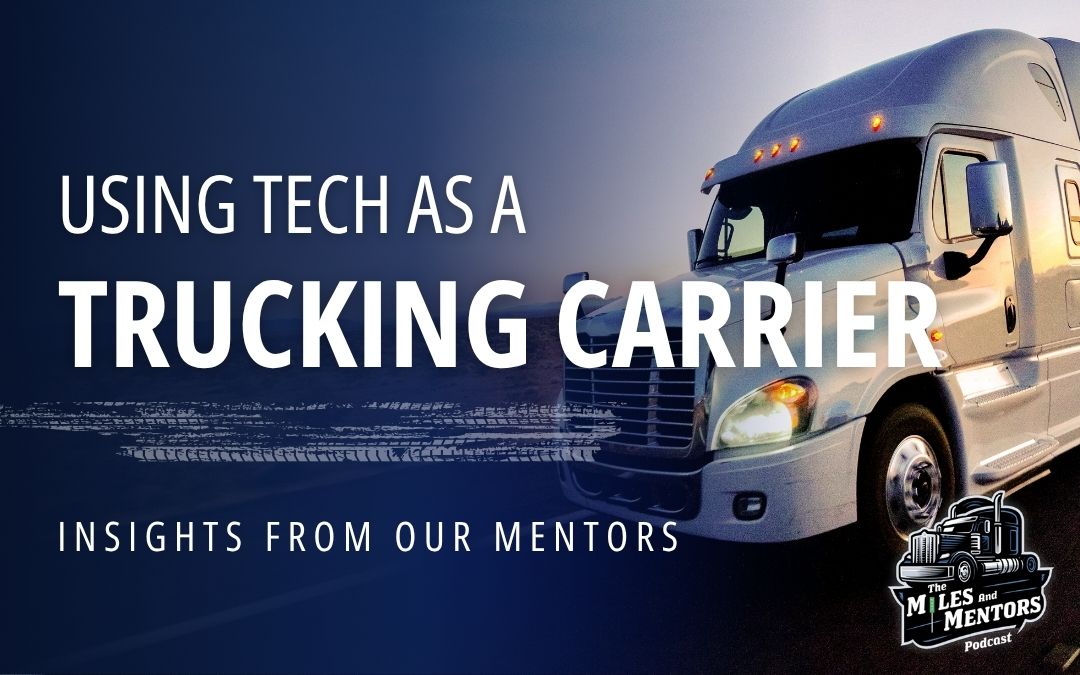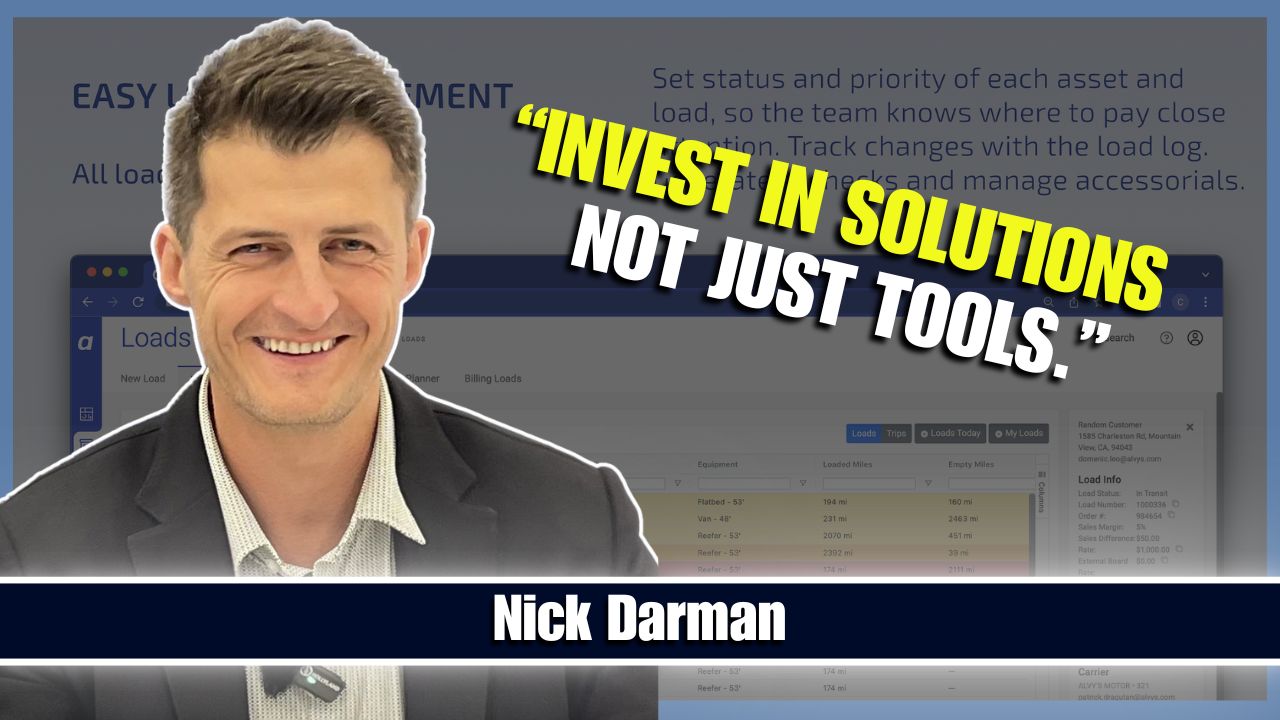Starting a trucking business or growing a small fleet is no easy task. Small carriers face intense trucking market challenges, from rising fuel costs to tough competition from larger fleets. These hurdles can make it feel like you are constantly trying to catch up. But trucking technology has become a powerful equalizer, allowing even the smallest carrier to compete on a national level. At Miles and Mentors, we understand these pressures. With our experience and insights, we are here to help you leverage technology for trucking success and achieve greater results.
The Importance of Technology in the Trucking Industry
What is the Biggest Problem in the Trucking Industry?
The biggest problem for many small carriers is staying competitive while managing tight profit margins and unpredictable freight cycles. Without technology, it is easy to fall behind. Small carrier tech adoption is now crucial for owner-operators and small fleets to survive and thrive in the American trucking industry.
Understanding the Competitive Landscape
The American trucking associations have consistently highlighted how rapidly this sector is evolving. The Des Moines Area Community College recently partnered with the American Trucking Associations ATA to provide training on logistics technology trends and adoption of electric vehicles. Large carriers have access to advanced systems and bigger networks, but small carriers can level the playing field with the right logistics technology trends and owner-operator strategies. Tools like transportation management systems, load tracking apps, and predictive analytics are helping small fleets stay in the game.
How Small Carriers Can Leverage Tech to Compete with Larger Fleets
To compete with big players, small carriers need to embrace trucking technology. Using tools like CRM in trucking, automated tracking, and EDI/API integration in trucking helps carriers streamline operations, improve communication, and scale efficiently. These competitive trucking strategies are essential for modern small fleets.
Insights from Anthony Villanueva’s Experience
Brief Background on Anthony Villanueva and His Expertise
Anthony Villanueva has over 18 years of experience in the American trucking and logistics sector. From cold calling shippers to building large customer books, he has seen it all. His deep understanding of the supply chain and technology’s role in it makes his advice invaluable for small carriers.
Key Lessons Learned from 18 Years in the Industry
Anthony’s key lesson is simple: embracing technology is no longer optional. Small carriers who avoid tech often get left behind. Those who adopt it grow faster, stay organized, and handle market volatility better.
Anthony Villanueva Trucking Insights: Using Tech for Success
Anthony Villanueva trucking insights highlight the importance of blending technology with solid relationships. He believes trucking industry mentorship and continuous learning are the keys to scaling a trucking business sustainably.
Essential Technologies for Small Carriers
CRM Systems for Enhanced Customer Relationships
CRM in trucking helps small carriers manage customer data, track communication, and identify new opportunities. It ensures nothing gets lost and every shipper feels valued.
Benefits of Adopting a CRM System
A good CRM helps you respond faster to customer inquiries, manage follow-ups, and offer better service. Small carriers using CRM in trucking see improved shipper satisfaction and more repeat business.
How CRM Systems Streamline Communication and Service
Instead of managing dozens of emails and phone calls separately, everything is in one place. This makes your business more efficient and easier for customers to work with.
Case Studies of Small Carriers Using CRM
Many small fleets have secured dedicated lanes and improved cash flow by using CRM systems. These tools help them scale and compete with larger fleets.
Automated Tracking Tools for Improved Visibility
Importance of Real-Time Tracking in Logistics
Shippers expect accurate updates. Load tracking apps give small carriers real-time visibility into where their freight is and help them plan better.
Overview of Popular Load Tracking Apps
Small carriers are using load tracking apps and advanced telematics solutions to gain a competitive edge. These apps are now easily available for download on platforms like the Apple App Store, providing convenient access for drivers and dispatchers.
Strategies for Integrating Tracking Tools
Start by using tracking for high-value loads. Then, as you build confidence, expand tracking to all shipments. This ensures better control and reduces errors.
Connected Platforms and EDI/API Integration in Trucking
How Connected Platforms Help Small Carriers
Connected platforms bring everything together from dispatch to accounting and load tracking apps all in one place. This saves time and reduces confusion.
The Power of EDI/API Integration in Trucking
EDI/API integration in trucking allows small carriers to quickly share load data with brokers and shippers. This makes your business easier to work with and builds your reputation.
Examples of Successful EDI/API Integration
Anthony Villanueva has seen small carriers who use EDI/API integration in trucking grow faster because they can handle more freight seamlessly.
Common Pitfalls and How to Avoid Them
Overexpansion and Its Consequences
Growing too fast can be a recipe for disaster. Many small carriers try to add too many trucks without the systems to support them.
Strategies for Setting Realistic Growth Benchmarks
Set goals like growing from one truck to five, and then to 25. Use technology to track performance and stay focused.
Importance of Maintaining Efficiency
No matter how fast you grow, staying efficient is key. Technology ensures you do not lose track of loads or customers.
Resistance to Technology Adoption
Why Some Small Carriers Resist Tech
Some small carriers worry tech is too expensive or complicated. Others just stick to what they know.
Practical Steps to Foster a Culture of Tech Adoption
Start small. Use one piece of trucking technology to fix a problem, then expand from there. This makes it less overwhelming and more natural.
Success Stories of Overcoming Resistance
Anthony Villanueva trucking insights highlight small fleets who started using load tracking apps and CRM in trucking, and quickly saw better service and stronger cash flow.
Future Technology Trends in Trucking
Preparing for the Future of Trucking Technology
What Technology is Used in Trucking?
Small carriers are adopting CRM systems, automated tracking tools, predictive maintenance, and AI-powered analytics. Adoption of electric vehicles is also on the rise, supported by various agency federal government programs and incentives.
How Small Carriers Can Stay Informed
Follow industry experts like Anthony Villanueva and Miles and Mentors. They share the latest logistics technology trends and practical owner-operator strategies.
Strategies for Long-Term Success
Always test new technology and listen to what works. Embrace trucking industry mentorship and stay open to change.
Building Resilience and Strong Networks
What is a Virtual Trucking Carrier?
A virtual trucking carrier uses technology to operate flexibly without a massive asset-based fleet. This model relies on connected platforms to stay efficient.
Importance of Networking in the Trucking Industry
Building connections is essential for growth. Technology alone is not enough strong relationships keep you informed and connected.
Tips for Building and Maintaining Networks
Use LinkedIn, attend events, and connect with mentors. This helps you learn from others and find new opportunities.
The Role of Collaboration
Collaboration with other carriers and brokers helps small fleets weather market volatility and find new lanes and opportunities.
Ready to Take Your Trucking Business to the Next Level?
If you are starting a trucking business or growing your fleet and need expert insights, reach out to us today. Our partners can help you make the right decisions for long-term success. Please read our user agreement privacy policy and privacy policy cookie to understand how we handle your data and provide our services.



